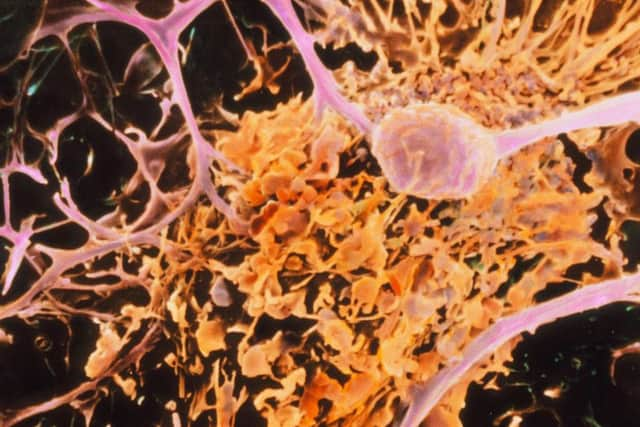Groundbreaking stem cell therapy for multiple sclerosis recommended for use in Scotland
and live on Freeview channel 276
An international clinical trial proved Haematopoietic stem cell transplantation (HSCT) could reboot MS patients' immune systems and halt the progress of the disease.
The treatment has already shown positive results in other countries around the world where it is administered, such as Mexico, Russia and Israel.
Advertisement
Hide AdAdvertisement
Hide AdSome patients who had been in wheelchairs prior to treatment said their condition improved so dramatically it was like they had never been diagnosed with MS.


The Scottish Health Technologies Group (SHTG) said there is now sufficient evidence for it to recommend making HSCT available on the NHS in Scotland.
It would be provided to patients who have the relapsing-remitting form of the disease - where relapses last at least 24 hours - and who were not responding to treatments.
Lucy Clarke from the Scottish HSCT Network said the recommendation was "a huge step forward" for people in Scotland living with MS.
Advertisement
Hide AdAdvertisement
Hide AdMs Clarke underwent HSCT in Russia and credits it with substantially reversing her disability.
She added: "This important decision supports HSCT as a treatment option where other treatments have failed.
"We will continue to push so that this treatment is available to people in Scotland who need it."
Scotland has one of the highest rates of MS in the world.
But Scottish patients seeking HSCT have had to travel overseas while bankrolling their own private treatment at a cost of around £40,000 to £60,000.
Advertisement
Hide AdAdvertisement
Hide AdIt has also been available privately in London since 2017 but costs a lofty £100,000.
Iain Robertson, chairman of the SHTG, said: "Our committee members were able to advise that this treatment should be considered for those with this particular type of MS who have not responded to treatment with disease modifying therapies.
"We hope that our advice will be of use in helping decide the best course of treatment for these patients."
However, the SHTG also stressed patients must be made aware of the "demands, risks and uncertainties" of the treatment.
Advertisement
Hide AdAdvertisement
Hide AdIt uses chemotherapy to wipe out patients' "faulty" immune systems before replenishing it with a transplant of stem cells harvested from their own bone marrow.
It puts patients at high risk from infections, which can be fatal.
But the theory is that the treatment works by enabling patients to "reset" their immune system to stop it attacking the central nervous system - as is the case in MS.
HSCT is not considered an effective treatment for patients with the progressive form of MS.
Advertisement
Hide AdAdvertisement
Hide AdHowever, as stem cells cannot regrow nerves or repair damaged myelin - the protective sheath coating nerves.
It will also be unavailable to patients with relapsing-remitting MS who no longer show signs of inflammation on an MRI brain scan.
Morna Simpkins, director of MS Society Scotland, said: "The decision from SHTG to approve HSCT for the treatment of MS is good news and could help in the development of a clear pathway, for people who could potentially benefit, to access it.
"We will push to ensure this decision leads to real change for people with MS by continuing to engage with other groups to offer the treatments, including HSCT, which are right for them."
Advertisement
Hide AdAdvertisement
Hide AdThe SHTG said eligible patients must have equal access to the procedures regardless of where they live, but it is unlikely all health boards will be able to provide it.
The MS Society wants a centre, or centres, of excellence set up where patients from across Scotland can be referred.